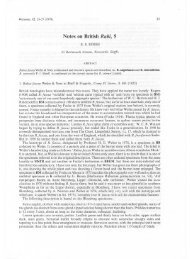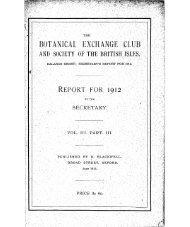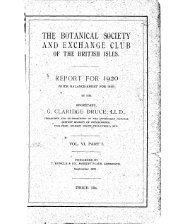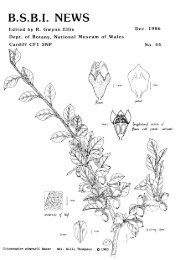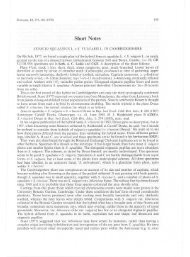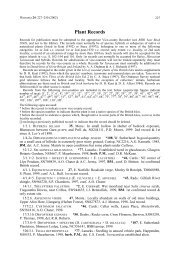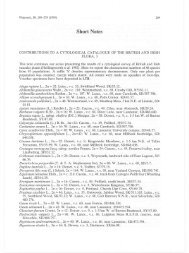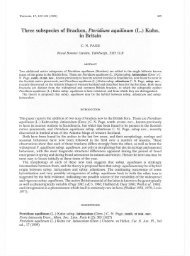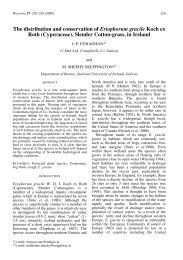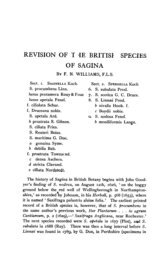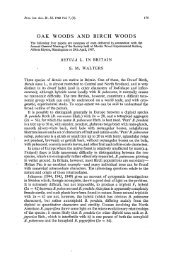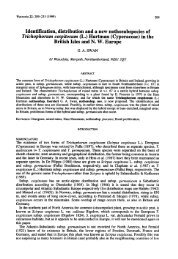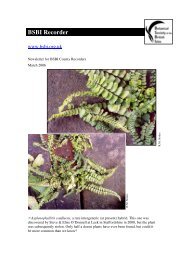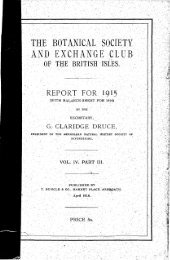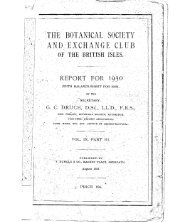You also want an ePaper? Increase the reach of your titles
YUMPU automatically turns print PDFs into web optimized ePapers that Google loves.
273 NEW PUBLICATION.<br />
other scented flowers, the remnants of recent religious processions. . . . The<br />
houses of Leon are nearly all but one story high, and built of sun-dried briclfs,<br />
of adobes, and somewhat in the Modrish style, there being a large square yard<br />
in the centre of the houses, surrounded by a broad verandah, on to which all<br />
the rooms open out. . . . The yards, or pateos, are, in some instances, neatly<br />
kept as gardens, where one finds a few Plantain, Orange, Pomegranate, Soursop,<br />
and Mango-trees, as well as Roses, Cockscombs, Gomphrenes, Fraugipanis,<br />
Jessamines, and PoUanthes tuherosa ; highly-scentQd flowers seeming to be<br />
those most cultivated. During tlie dry season these plants require constant<br />
irrigation, the water being obtained from deep wells, of which there is generally<br />
one iu every yard."<br />
In the woods of the neighbourhood<br />
" we frequently perceived a most offensive, carrion-like smell, wliich at first<br />
was thought to come from some dead animal matter, but was speedily traced<br />
to the flowers of a middle-sized tree, in habit not unlike the Caoutchouc {Castilloa<br />
elastiea, Cerv.). This tree our men called ' Palanca,' its wood being<br />
used, amongst other things, for levers or falancas. The leaves were oblong<br />
and velvety, and from the growing branches developed flowers not unlike in<br />
shape and size those of Tuhps. The most remarkable thing was tlaat these<br />
flowers on first opening were quite green, and free from smell, but they gradually<br />
changed into a dark purple, almost black, and then emitted a most powerful<br />
smell, quite as, or rather more disagreeable, than that of some Stapelias,<br />
Aristolochias, and Aroidece, and, iu a less degree, the fruit of St. John's Bread.<br />
It is strange that this carrion-like smell in plants should in so many cases<br />
accompany a dark brown or dark blue colour, and it would be worth while to<br />
endeavour to ascertain the chemical principle here at work. At the base of<br />
each of the six petals, the Palanca has a gland, and I fancied that the smell<br />
principally proceeded from its secretions. To my delight I found that the<br />
plant constituted a new genus of Anonacere, distinguished by having the largest<br />
known petals of the Natural Order to which it belongs. Afterwards I met<br />
with it in abundance between Leon and Gi'anada, and coUected good specimens<br />
of it for our herbaria. At the suggestion of Mr. J. J. Bennett, F.R.S., of the<br />
British Museum, I gave it tlie name of Sap)ranfhus Nicuraf/uensis. I am<br />
sorry to add, however, that my travelling comimnions who afterwards saw me<br />
busy myself with the plant would not adopt this correctly-formed and expressive<br />
Greek name, but insisted upon dubbing it ' Stinkadora."<br />
After remarking on the so-called mimicry of Nature, Dr. Seemann<br />
describes his departure from Leon for the little-known districts of New<br />
Segovia and Matagalpa. \This happened on the 4th of April, the fag-<br />
end of the dry season,<br />
" Towards five o'clock we reached a place called Valle de Zapata, a mere<br />
collection of huts, where a little Indian-corn and cotton was grown, the latter<br />
being the mossy-seeded variety. Tiie people were much disappointed that the<br />
cotton prices hud gone down so much, and thought it a hard case that the<br />
United States should have discontinued their fratricidal war just at a time<br />
when Nicaragua was getting ready to send a few hundred bales of cotton to the<br />
Liverpool market. Cotton cultivation in tliis country has not been successful,<br />
in most seasons a worm entering tlic pods ju?t wlu'ii tliey begin to ripen, and<br />
thus destroying the crops. If it were not for this, the Nicaraguaus delude<br />
—



